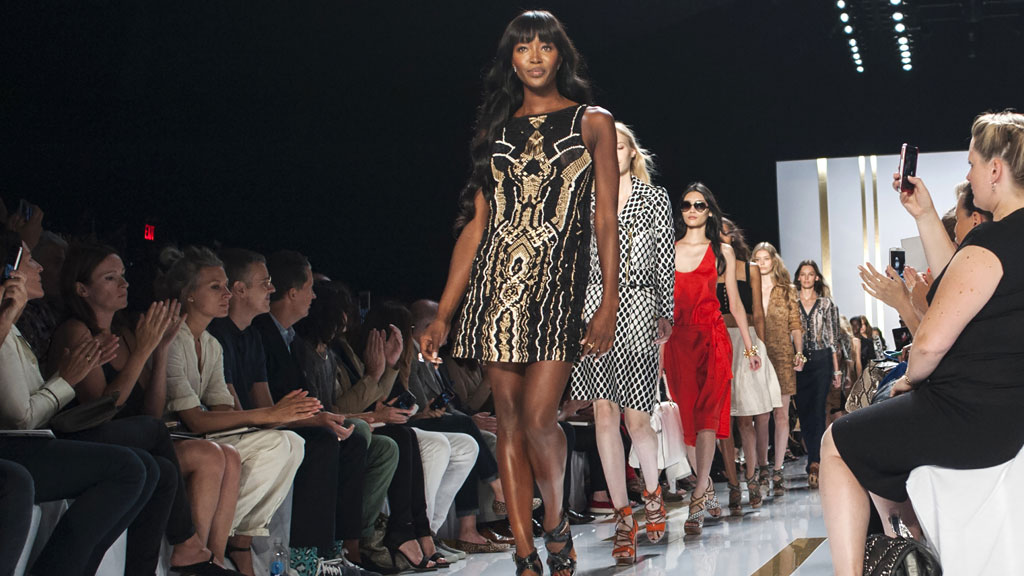In fashion: why diversity should be the new black
She is one of the most beautiful women in the world, but one of the few black models on the catwalk. As Naomi Campbell demands more diversity, is the fashion world listening?

The world might be embracing diversity – but not, say leading black models, the world of high fashion. In an open letter to major fashion houses, Naomi Campbell has joined forces with Iman and former model Bethan Hardison to ask why they continue to define beauty as virtually all-white.
There has been no official comment from any of the designers they named, although the Council of Fashion Designers of America did issue a statement, declaring that “the most powerful message is one of diversity”.
But the statistics are clear: at last week’s New York Fashion Week, just 6 per cent of models walking the shows were black, and 9 per cent Asian; 13 shows featured no models of colour at all.
Jenna Sauers and Dodai Stewart have been compiling the figures for Jezebel since 2008. They have found very little progress since then – in fact this autumn, there were slightly fewer black and ethnic minority models on the catwalk than previous years.
All fashion spent
Beverley Johnson, who was the first African American woman to grace the cover of Vogue back in the 1970s, is furious, telling the Daily Beast there was “a trend of exclusion that is glaringly insulting and simply unacceptable to me”.
There were a few New York designers who bucked the trend – as the New York Times fashion reporter Eric Wilson noted:
Five black models at Calvin Klein. Bravo.
— Eric Wilson (@EricWilsonNYT) September 12, 2013
But is Britain any different? The British Fashion Council, in the midst of the hectic whirl of London Fashion Week, told Vogue: “All participating designers should recognise that London is one of the most multicultural cities in the world and should consider reflecting this demographic in their shows.”
Last year, miliner Philip Treacey sent an all-black cast down the runway – describing the spring/summer 2013 show as “an homage to the African woman and the sensibility to dress up”.
His models included the London supermodel Jourdan Dunn, who has said in the past: “London’s not a white city, so why should our catwalks be white?” Another star-in-the making, Premier’s Leomie Anderson, thanked Treacey for a “once in a lifetime opportunity”.
London’s not a white city, so why should our catwalks be white? Jourdan Dunn, supermodel
Premier’s boss, Carole White, has talked about the difficulty of getting black models cast in runway shows and campaigns, especially in France or Italy, which have become notorious for their Caucasian aesthetic.
It is why former model Melissa Drummond set up her own agency, Cliche, specialising in models from all sorts of ethnic backgrounds. She told Channel 4 News that what Naomi Campbell had said was what everyone else had been thinking.
“The world is multicultural,” she said. “Our looks represent our heritage, and that’s something to be celebrated.” She has sent girls on castings and jobs, in the hope of persuading clients to think outside the box.
From here to diversity
“It’s up to the whole industry: agencies have to represent men and women from all sorts of backgrounds, then casting directors have to think a bit differently about campaigns and find someone who’s unique and fresh”, she said.
Girls from her agency have just taken part in Africa fashion week: some got featured in Elle. “If you’re black you’ve always got so much to prove – it puts you on the defensive or makes you seem aggressive when you go after jobs, That’s not it at all – we just want to be included, part of the mainstream.”
The fashion industry is constantly questioned over its promotion of a certain idea of perfection: race is not the only matrix – there is age, size, weight. Many million pounds hang on getting it right, that photo-freeze runway moment that should sell a thousand frocks.
Naomi Campbell and her fellow campaigners want diversity to become the norm, not consigned to a niche. Monochrome, they say, is just so last season: and black women are prepared to be fashion victims, no longer.
Felicity Spector writes about US affairs for Channel 4 News
-
Latest news
-
Diane Abbott row overshadows Labour’s health policy4m

-
Jury deliberating in Trump hush-money case3m

-
Social housing shortage: ‘When I’m 65, if I’m still renting, I can’t retire.’3m

-
What happened when this hotel used to house asylum seekers closed down6m

-
Have governments in England, Wales or Scotland met their house building targets?2m

-




